Yes! I'd like to be contacted to schedule a consultation!
As a paving pro, you know speed and precision are everything. You can’t afford to let materials set before the job is done—just like you can’t let competitors cement their spot online before you secure yours.
The same rules apply to digital marketing. Success comes from quick action, sharp strategy, and staying ahead. That means optimizing your website, targeting the right keywords, and making sure potential clients find you before they end up with a competitor.
In this guide, LinkNow breaks down the essential SEO strategies for paving companies. We’ll cover keyword targeting, local SEO, content marketing, and building trust to boost your authority online.
By the end, you’ll have a clear roadmap to create a powerful web presence that drives traffic, wins leads, and helps you close more paving jobs in your area.
With the right SEO tactics, local search optimization, and content marketing, you can dominate search engine rankings and become the go-to paving service in your area.
Whether it’s geo-targeted keywords, strategic backlinks, or cleaning up your citations around the web, each element plays a role. You can also build authority by writing how-to blogs or learning how to create compelling website content. Together, these strategies help drive traffic, generate leads, and secure more paving projects.
In short, you need SEO because you can be the best paver in town and still miss out on all the clients you could capture without it.
You want to become the internet’s top choice in asphalt contractors. What’s the first step? It’s always building trust and authority. While the concept seems simple, it’s easy to get overwhelmed by the countless instructions on how to actually do it.
Some resources say that having a well-designed website is enough. Others stress the need to go further by improving user experience (UX) and answering client questions. They also highlight the importance of addressing pain points, collecting customer reviews, and earning backlinks. On top of that, interacting with potential clients on social media and mastering local SEO can make a big difference.
The truth is that it’s a combination of these elements that truly establishes your business as a trusted authority in the paving industry. To get ahead, you need to know about Google’s E-E-A-T system.
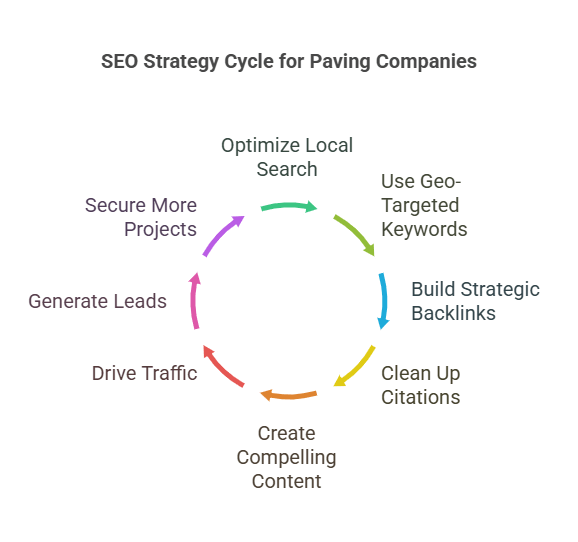
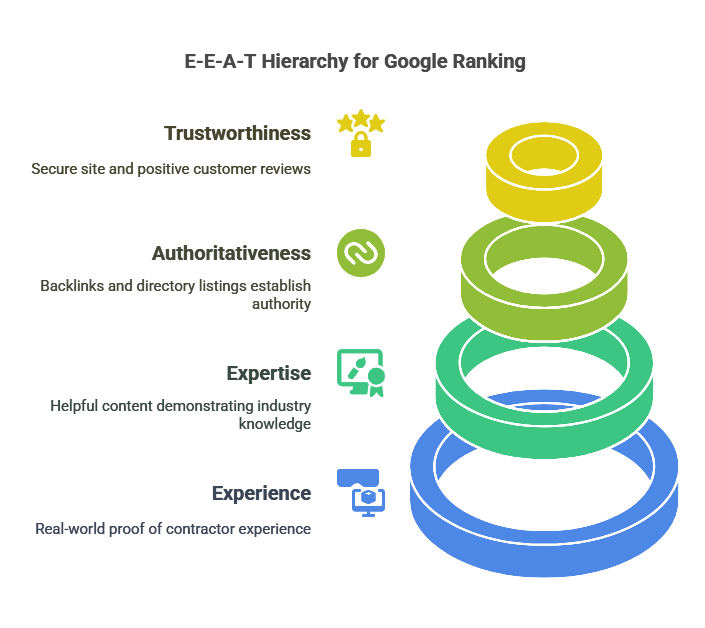
When someone searches for paving services online, Google sorts through millions of web pages to find the most relevant, trustworthy, and helpful content. To do this, they use a system called E-E-A-T, which stands for Experience, Expertise, Authoritativeness, and Trustworthiness.
So, what does that mean for your paving business? Google wants real-world proof that you’re an experienced contractor who knows your craft. To satisfy Google’s authority signaling requirements, you should include photos of past projects, customer reviews, and detailed service pages that tell Google and your potential clients that you know what you’re doing.
Writing helpful blog posts and answering common paving questions—for example, “How long does it take to pave a driveway?” and “How often should you seal concrete?”— shows expertise. At the same time, other SEO elements, like earning backlinks from reputable websites and listing your business in trusted directories, help establish your authority.
Trust is another ranking factor that sounds simple, yet there are still some career pavers out there who get it wrong. When considering how trustworthy you are against another paving business, Google (and potential clients) pay attention to whether your website is secure (HTTPS encryption), whether your contact details are accurate across online listings, and whether customers leave positive reviews about your work.
Technical SEO also plays a role. A fast-loading, mobile-friendly website that’s easy to navigate improves user experience, boosts your search rankings, and shows people (and search engines) you’re a paver who cares about them. Don’t discount improvements to your website’s performance as a good way to demonstrate you’re a reliable service provider, but keep in mind there’s a whole lot more you’ll need to know about to capture a coveted number one search position.
There are hundreds of other ranking factors Google users on top of its E-E-A-T system. While many are unavailable to the public, the search giant has made a point of drawing attention to the most important ones.
Here are some of Google’s (known) rank factors that affect SEO for paving contractors:
The content that consistently claims the first place in Google searches (across all industries) is always the most relevant, engaging, unique, and informative content available on the topic. To write high-ranking content as a paving contractor, you need to understand your audience’s needs and structure your pages accordingly. Hop over to our guide on understanding semantic search for more in-depth instructions on how to do this.
Captivating content that converts begins with researching high-performing keywords related to your services and using these terms naturally throughout your website, blog posts, and service pages to bolster your content’s readability and generate resonance with your target audience.
Aim for value-driven content that answers common customer questions, like "How long does asphalt paving last?" or "What’s the difference between asphalt and concrete?"
When people visit your site, they expect to see:
What they don’t want is a bunch of empty promises, a wall of words and sales fluff, questionable graphics, or any barriers that prevent them from finding the answer to their query. To further boost SEO, include high-quality images and videos of your completed projects. Additionally, add internal links to related services. Finally, keep your content evergreen through regular updates.
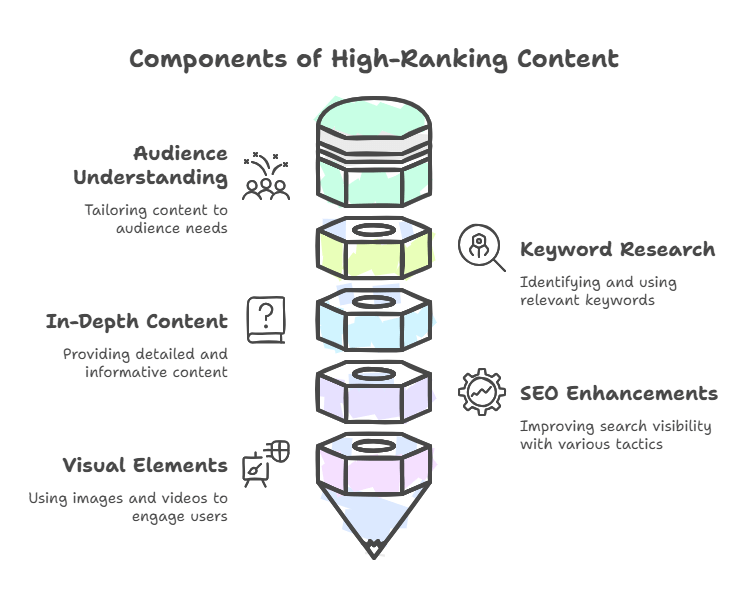
To optimize your content effectively, you need to have a brainstorming session to come up with the best keywords, phrases, and search queries that potential clients might use to find paving services. These keywords should accurately describe your business and align with what users (and Google’s crawlers) expect to see on your page.
In the next section, we’ll dive deeper into how to find the right keywords. Right now, we’ll focus on where to use them once your keyword list is ready.
A solid SEO strategy places your paving service keywords strategically in:
Bonus: You can also use keywords in the anchor text you make clickable for internal links. The key here is to keep it clear and descriptive so users immediately understand where the link will take them. When your links are transparent and relevant, people are more likely to trust them—and click through to explore more of your site.
Now that you know where to use keywords, the next step is finding the best ones to target for your paving business. The right keywords capture traffic, generate leads, and improve your search rankings. The wrong ones bring in unqualified leads and waste your marketing budget on users who don’t need or want your services.
Here’s how to find impactful keywords that put your content in front of people who are ready to pay for paving:
Combine these strategies to generate a user intent-focused keyword cluster that helps your paving company rank higher and attract more customers.
Keeping your website content fresh and relevant is another element of maintaining strong search rankings and engaging potential customers.
For optimal SEO results, aim to:
SEO perfection doesn’t revolve around a single best word count. However, it hasn’t gone under our radar that celebrity SEO all-stars like Neil Patel and other industry heavyweights like Semrush say longer, well-structured, high-quality content consistently ranks higher in Google search results. This is what we’re seeing too.
The real solution is to worry less about hitting a specific word count and pour your efforts into making content that’s comprehensive, informative, and valuable to your audience.
Here’s a general guideline for paving contractor content word counts:
While length is significant, content quality and readability matter more. To maximize UX, consider breaking up text with headings, bullet points, images, and internal links. Your goal is to answer user intent effectively. A page that’s too short may not provide enough information to rank well.
Content that’s too long and lacks structure is also a problem. Users who encounter this will likely leave before engaging with your message. Balancing your word counts with depth, clarity, and unique industry perspectives will satisfy users and propel you toward the high rank you want.
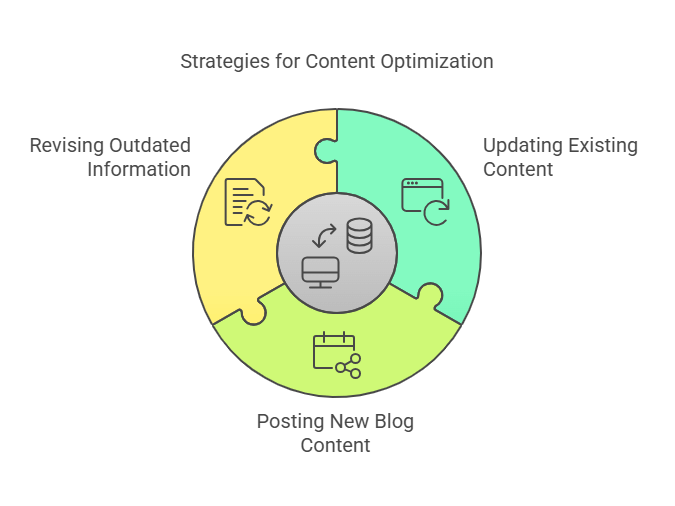
Google’s crawlers rely on internal links to understand the structure of your website and how your pages relate to each other. For your visitors, these links act as a roadmap, helping them explore more about your services, expertise, and value as a paving contractor. Done right, internal linking improves user experience (UX) and boosts your SEO simultaneously.
A strong internal linking strategy helps distribute page authority throughout your site, giving key pages like your service areas, contact forms, or high-performing blog posts a better chance to rank. It also increases dwell time (the amount of time users spend on your site), which tells Google that your content is engaging, helpful, and worth ranking higher.
Tips for effective internal linking:
Internal links should feel helpful, not hard-sell. When your internal structure supports intuitive navigation and provides additional resources, visitors stick around longer, and Google takes notice.
Yes. Title tags and meta descriptions are essential pieces of HTML that improve UX and tell users what to expect when they engage with your paving content.
Although Google doesn’t count likes or shares as direct ranking factors, your social media presence still plays an influential supporting role in SEO. Social activity fosters stronger connections between your business and the people who live, work, own property, and do business in your community.
Here’s how your social media strategy can give your SEO the edge it needs, helping your potential clients and search engines see why there’s no other paving company around that even comes close to comparing to you:
That’s the fundamentals of what a well-thought-out social media presence can do to distinguish you as a trusted and worthy resource for paving solutions. Now, we can talk about local SEO and why pavers who prioritize it are getting ahead.
When you want more customers near you to find your paving business online, local SEO will help you stand out, but only if you do it right. You’ll need to set up and optimize your Google Business Profile (GBP) with up-to-date contact information, service areas, and photos of your work. When people search for paving services, Google prioritizes businesses that have complete profiles and active engagement (regular updates, quick responses, etc.).
Customer reviews also matter. The more positive feedback you have, the more trustworthy and credible your business appears. Plus, Google tends to rank businesses with better ratings higher in search results. Another thing to consider is location. Google often shows the contractors closest to the searcher at the top of Google Maps results, so don’t forget to define your service areas clearly.
Finally, use local keywords like “driveway paving in [Your City]” throughout your website and content to help search engines connect your business with the right customers.
Citations are online mentions of your business name, address, and phone number (NAP) across directories, websites, and social media platforms. These listings help search engines verify your business information and determine its legitimacy. Consistent NAP details across all citations build credibility with Google, improving your local SEO rankings.
Inconsistencies, like outdated phone numbers or mismatched addresses, can confuse search engines and hurt your visibility in local searches. Your Google Business Profile (GBP) is at the heart of this process. It’s the primary citation that Google pulls its data from.
This is why you need to make sure your GBP matches the information on other listings, like Yelp, Angi, and local business directories. Doing this strengthens your authority and increases your chances of appearing in Google’s Local Pack (the top business listings shown for location-based searches).
Do you need advice on setting up your paving business in GBP? Check out our handy guide on how to set up the top 5 citations.
Google views backlinks as votes of confidence, meaning the more reputable sites that choose to link to your website, the more trustworthy your business appears. Full stop. You should know that not all backlinks are created equal. Getting quality links from authoritative sources matters more than casting a large net and accumulating a whole bunch of questionable links.
Here’s how successful paving firms earn credible backlinks:
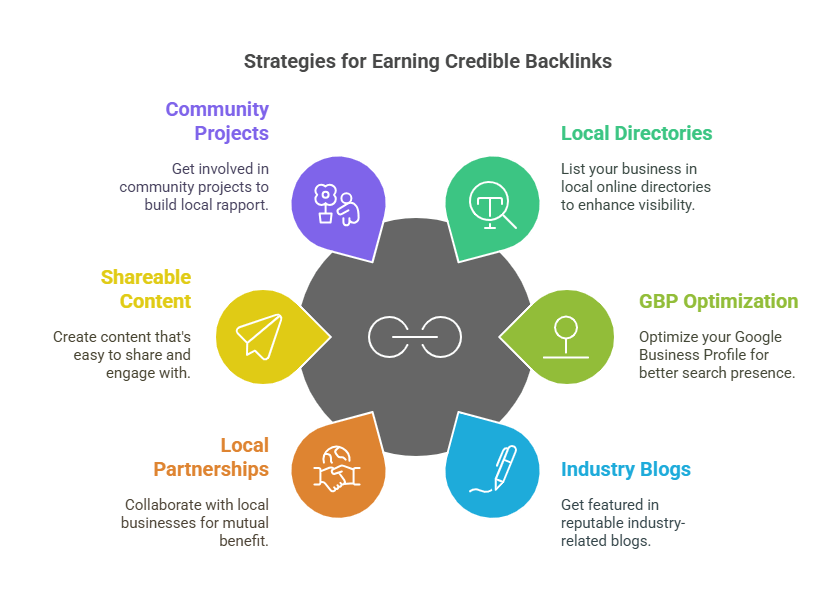
Even if you offer the longest-lasting paved surfaces and the lowest prices, you'll miss out on leads if potential clients can't find you online. Similarly, if search engines don't see you as a credible option due to a lack of local SEO, you're also missing out on opportunities. Smart link-building and harnessing your GBP help bridge that gap and put your paving business on solid digital ground. Building a strong online foundation for your paving company sets you up to enjoy the rewards of your hard work. This effort leads to more businesses and homeowners choosing your paving services. Consequently, they are also more likely to recommend you to their families, friends, and colleagues.
That covers how to make a splash online, but that’s not the only mountain you’ll need to summit to seal your competitors out of closing deals with property owners in your community. Visibility is one thing, but knowing what’s working (and what isn’t) is what allows top paving firms to stay ahead. Continue reading to learn which user and engagement signals show you when and where your SEO tactics are paying off.
If you tried to track every engagement metric out there, you’d never have time to install driveways, walkways, roads, foundations, patios, and other hardscaped surfaces that actually pay your bills. The good news? You don’t need to monitor everything, just the metrics that matter most.
Here are three user and engagement signals paving pros should keep a close eye on:
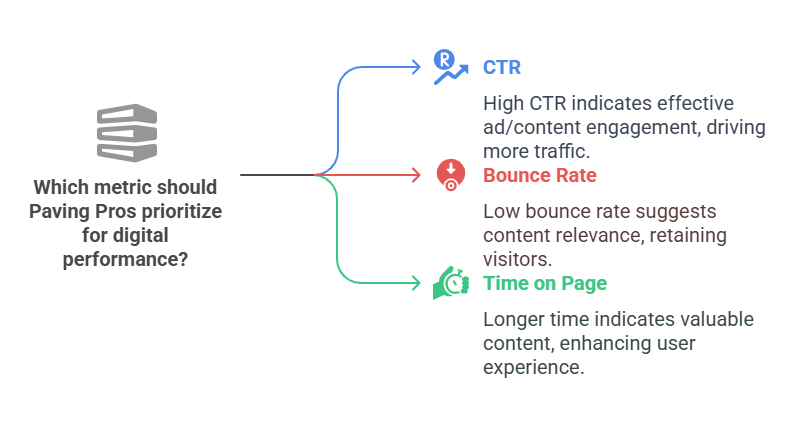
Click-through rate is among the top engagement metrics to track when evaluating your SEO performance. It represents the percentage of people who see your website listed in search results and actually click on it. A higher CTR means your listing is compelling and relevant, which sends positive signals to search engines and can contribute to rank improvements.
To monitor CTR, use Google Search Console. Navigate to the “Performance” tab to see impressions, clicks, and average CTR for each page and keyword.
CTR can vary based on industry and competition, but generally:
Bounce rate measures the percentage of visitors who land on one of your web pages and leave without clicking anything else or navigating to another page. For paving contractors, a high bounce rate could mean your content isn’t meeting visitor expectations or your site has technical performance issues (e.g., slow load times or poor mobile usability).
You can track the bounce rate in Google Analytics under the "Engagement" section. If your bounce rate is above 70%, it’s a red flag. However, context matters. A landing page geared toward getting more phone calls may still convert well, even with a higher bounce rate.
Always look at bounce rate alongside other signals like time on page, form submissions, and click-to-call events.
Time on page shows you how engaging and useful your content is. If visitors spend more time reading your service pages or blogs, it means they’re finding value, which is excellent for gaining credit in Google’s good books.
You can track this metric in Google Analytics by looking at the "Average Engagement Time" per page. Are your visitors bouncing too quickly? This might mean you’re serving thin content that isn’t scannable or relevant to what people want to know.
Your success in the paving industry relies on your precision on the job site, but that’s not enough these days. Now, you have to wear more than one hat and worry about your paving company’s online visibility, too. If your website doesn’t appear when people search for asphalt or concrete paving services in your area, you’re handing opportunities over to your competitors on a silver platter.
From keyword research and content creation to technical SEO, backlink strategies, and local search optimization, you now have the foundational tools to turn your online presence into a powerful lead-generating machine. Now, you can use our tips to track the right metrics and continuously fine-tune your efforts to stay ahead of the curve.
You don’t have to pave this path alone, though. LinkNow Media specializes in helping paving contractors like you rise through the rankings, attract qualified leads, and win more projects. Whether you’re just getting started with SEO or looking to level up your results, we’re here to build a strategy that works for your business and your budget.
Ready to roll out a strategy that actually drives results? Let’s build your digital foundation—contact us today for a complimentary SEO consultation.